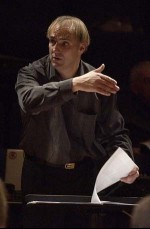| Daniel KawkaConductorCalled upon and invited by the greatest European symphony orchestras (such as the Orchestre philharmonique de Radio France, the Orchestre National de France, the Russian National Orchestra, the Orchestre de la Suisse Romande, the RAI National Symphony Orchestra, the Orchestre National de Montpellier, de Lille, de Lyon, des Pays de la Loire, the Philharmonic Orchestra of Liиge, the Rome Santa Cecilia National Academy Orchestra, the Orchestre Philarmonique de Nice, de Monte Carlo, the Varsovia Symphony Orchestra, the Ensemble Intercontemporain, the London Sinfonietta…) and the biggest music festivals (Paris, Rome, Brighton, Dublin, Varsovia, Budapest, Moscow, Montreal, Sao Paulo, Seoul…), Daniel Kawka is now regarded as one of the best interpreter of 20th century music and the Romantic repertoire, from Beethoven to Strauss, repertoire to which he now devotes much of his artistic activity. Music director of the Ensemble Orchestral Contemporain, he created in 2003 the “Festival Philharmonic”, symphony orchestra dedicated to the great classical works, Romantic and Modern, from the 18th to the 21st century. His broad repertoire extends to the opera and the great symphony works with choir, at which he excels. He leads on a regular basis the most reputed choirs and vocal ensembles such as the New London Choir, the Maоtrise de Radio France, the Stuttgart Neuevocalsolisten, the Synergy Vocals Ensemble, showing his claimed passion for the voice and the great vocal repertoire in general. In this regard, he conducted the major lyric works along with the great Romantic “frescos” such as Verdi’s Requiem, Brahms’ “Deutsch Requiem”, Mahler’s Symphony “Resurrection”, Berlioz’s “Romeo et Juliette”… He leads the world premiиres of Josй Evangelista’s opera at the Opera National de Lyon, of Suzanne Giraud’s opera “Le Vase de parfums” (written and directed by Olivier Py), and of Jacques Lenot’s opera at the Geneva Opera (January 2007). He conducts Bela Bartok’s “Blue Beard Castle” at the Opera de Nantes in September 2007 in the new Patrice Caurier and Moshe Leiser production. Among his current projects, we can quote Batistelli’s “Divorzio all’Italiana” given as a world premiиre at the Opera de Nancy in fall 2008, Wagner’s “Tristan and Isolde” produced by the Geneva Opera and directed by Olivier Py in June 2009, Wagner’s “Tannhдuser” directed by Robert Carsen at the Rome Opera in fall 2009. (And also Alban Berg’s Wozzeck during the 2009-10 season and a new run of Bartok’s “Blue Beard Castle” in fall 2011). In his further development of Wagner’s works, Daniel Kawka has placed a special emphasis on “Parsifal”, along with “Tristan” and “Tannhдuser” he will conduct in 2009, thus calling for the prestigious Anglo-Saxon and German stages. He is currently working on “Gцtterdдmmerung”, “Tosca”, “Salomй”, as well as Richard Strauss’ operas he’s really fond of. The German music - Beethoven, Wagner, Strauss, Bruckner, Mahler - , the Russian music – Chostakovitch, Prokofiev…- constitute his favourite repertoire. He has been thereby leading as invited conductor the complete set of Beethoven’s symphonies, Mahler’s symphonies (after having conducted his great orchestra lieder cycles like “Das lied von der erde” recorded in 2001 for the Selena Label), Richard Strauss’ symphonic poems, Chostakovitch’s symphonies (5th, 7th, 11th, 14th) as well as the complete set of Stravinsky, Bartok, Dutilleux or Boulez’s works. In that regard, he leaded in Russia in fall 2008 a great concert tour putting together Messiaen, Xenakis, Koering, Grisey, Bartok, Sibelius.
After very intense years of activity devoted to the interpretation of the contemporary repertoires, conducting about 400 works and premiиres, he has been now mainly focusing on the diffusion and the interpretation of the 20th century masterpieces, the ones he considers as the major works of our century, and is widely open to the recent, invention-rich English and American works. He finally belongs to the generation of conductors that considers the idea of specialization as another means of open-mindedness and stylistic work, the notion of “epoch” disappearing in favour of a more enlightened approach of the whole repertoire, whatever the periods. This mixing of musical styles, with a strong predilection for French, Italian and German music, proves the wide musical universe he explored at the head of the main symphony orchestras and operas.
| |
 Mariinsky Theatre:
Mariinsky Theatre:  Mariinsky-2 (New Theatre):
Mariinsky-2 (New Theatre):  Mariinsky Concert Hall:
Mariinsky Concert Hall: 


